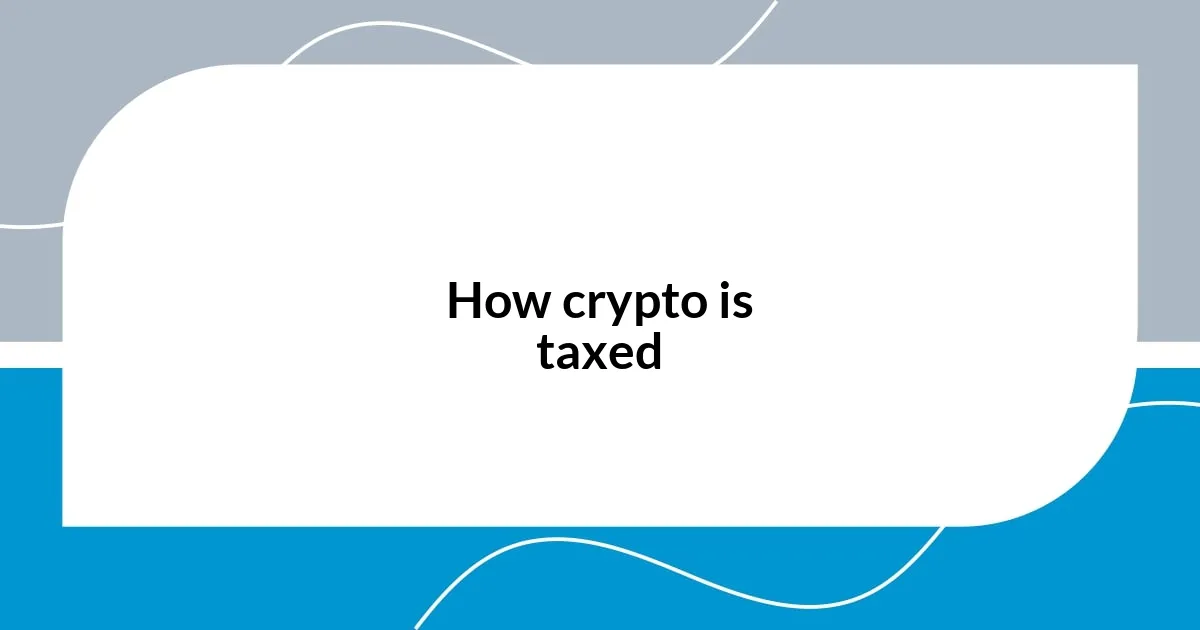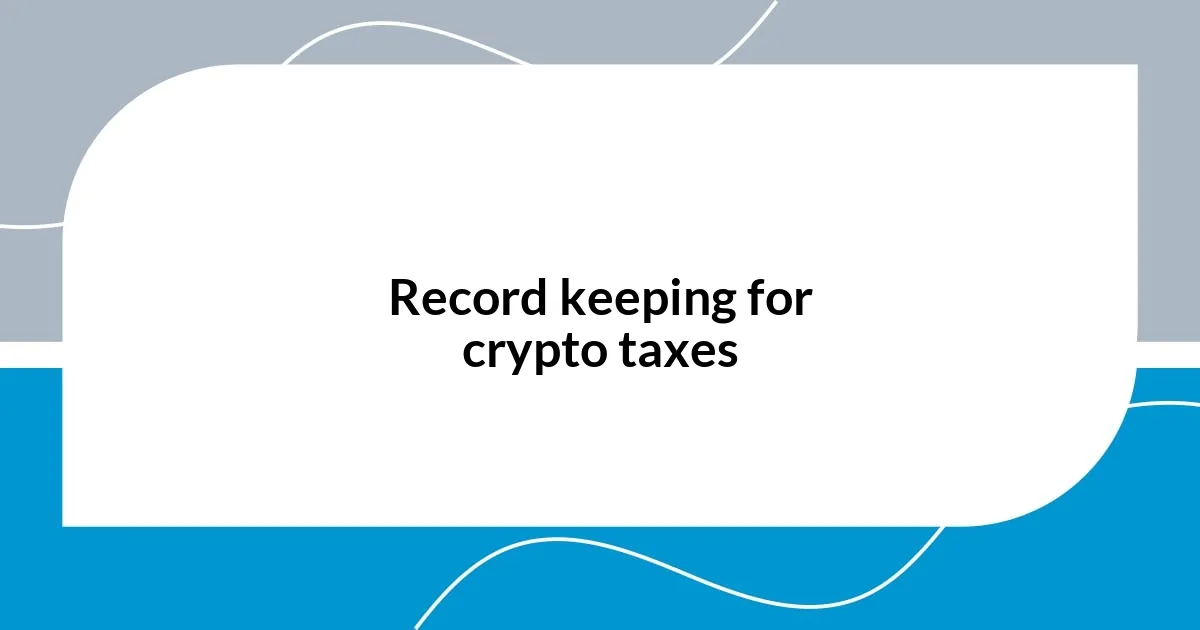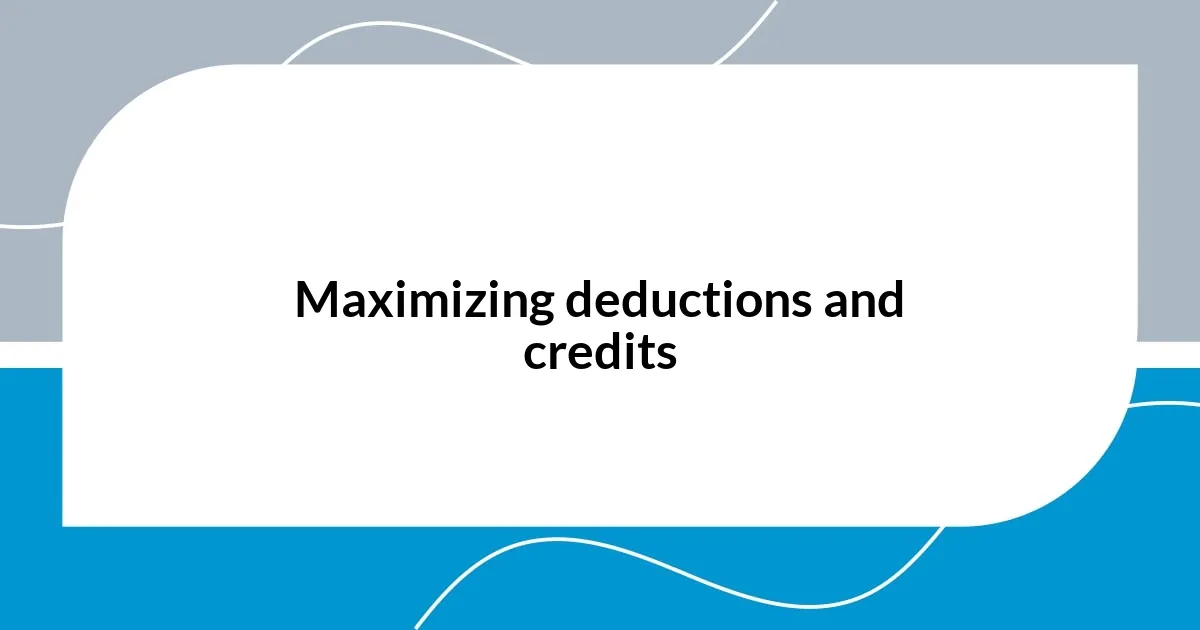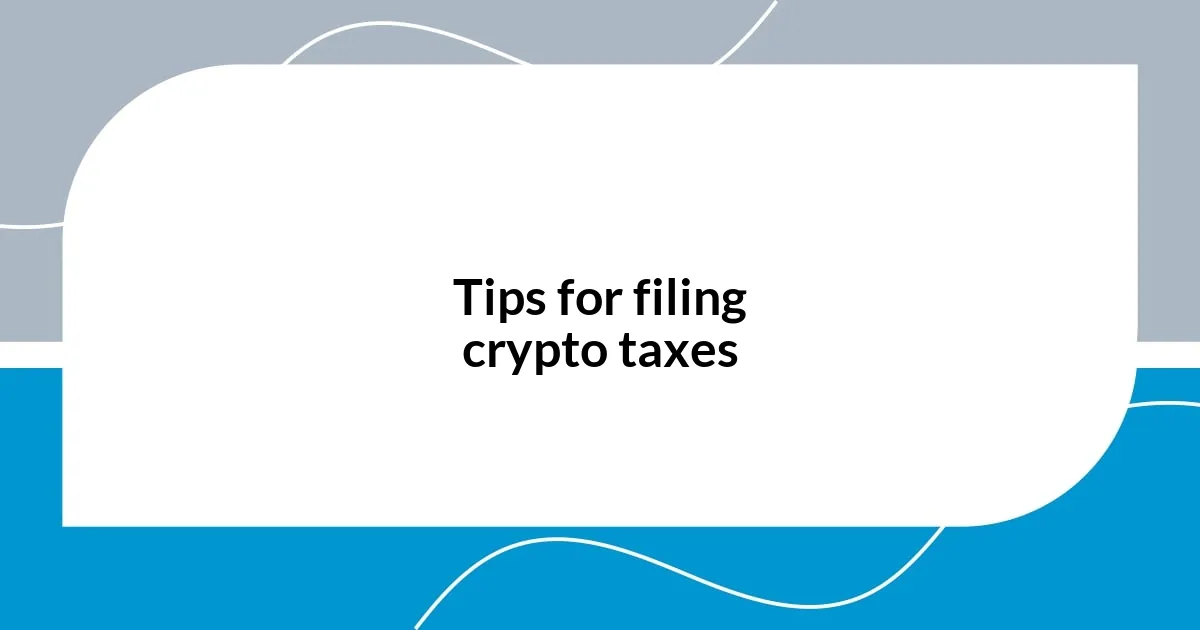Key takeaways:
- The IRS classifies cryptocurrencies as property, making each sale, exchange, or purchase a taxable event that requires careful documentation of gains and losses.
- Proper record-keeping is crucial; maintaining detailed logs of transactions can prevent stress and potential financial loss during tax season.
- Long-term holdings can benefit from lower capital gains tax rates, emphasizing the importance of understanding holding periods.
- Utilizing tax software and consulting with a tax professional can significantly ease the process and ensure accurate reporting of crypto transactions.

Understanding crypto tax basics
When it comes to crypto taxes, the first thing to grasp is that the IRS treats cryptocurrencies as property, not currency. This means that every time I sell or trade my digital assets, I have to consider capital gains or losses. Have you ever felt a knot in your stomach at the thought of tracking every transaction? I sure have, and it can be overwhelming!
It’s essential to note that when you exchange one cryptocurrency for another, that’s also a taxable event. I vividly remember the first time I swapped some of my Bitcoin for Ethereum—while I was excited about the potential gains, I was also anxious about how much this could complicate my taxes. Understanding that each swap could trigger a taxable event helped me be more diligent in my record-keeping.
Another crucial aspect is the importance of documentation. I learned the hard way that having detailed transaction records can be a lifesaver during tax season. Keeping track of dates, amounts, and prices at the time of each transaction feels tedious, but trust me, it pays off when you’re trying to navigate various jurisdictions and exemptions. How do you keep your records organized? Finding a system that works for you can help reduce that tax time stress significantly.

How crypto is taxed
When it comes to crypto taxation, it’s crucial to understand the implications of holding these digital assets over time. The IRS classifies cryptocurrencies as property, compelling you to report gains or losses as if you were selling stocks or real estate. I remember the panic I felt when I first realized that even the smallest trades could impact my tax obligations. It made me more aware of how every decision I made regarding my crypto investments could lead to unexpected tax consequences.
It’s fascinating to see how various forms of transactions affect tax liabilities. For instance, many people don’t realize that simply using crypto to make a purchase can trigger a taxable event. I used some of my Bitcoin to buy a gadget once, and while I loved the item, I suddenly became acutely aware that I needed to calculate how much I’ve earned from that transaction. That moment of realization emphasized the importance of keeping thorough records of not only my investments but also what I spent my cryptocurrency on.
Lastly, long-term versus short-term capital gains is a critical aspect of crypto taxes, and it often goes overlooked. If you hold your assets for more than a year, you may benefit from lower tax rates on those gains. I experienced this first-hand when pondering whether to sell my holdings before a major price spike or wait it out. Ultimately, deciding to hold on for the long haul not only aligned with my investing strategy but also helped me navigate potential tax implications more effectively.
| Transaction Type | Tax Implications |
|---|---|
| Buying goods or services with crypto | Taxable event; report capital gains/losses |
| Exchanging one cryptocurrency for another | Taxable event; report capital gains/losses |
| Holding crypto for over a year | Potential for lower long-term capital gains tax rates |

Record keeping for crypto taxes
Keeping accurate records for crypto taxes can feel like a daunting task—one I often grapple with myself. I remember when I nearly missed out on a small fortune because I couldn’t track down a crucial transaction from months prior. Having a reliable system in place can save you not only money but a lot of stress come tax season. Regularly updating your records after each trade or purchase can help ensure you don’t end up in a last-minute scramble.
Here’s a simple checklist I use to streamline my record-keeping:
- Record the date of each transaction.
- Note the type of transaction (buy, sell, exchange).
- Keep track of the amounts in both crypto and fiat currency.
- Document the transaction fees paid.
- Store any relevant receipts or confirmation emails.
By staying organized and consistent, I’ve found that I can focus more on my investments rather than sweating over my tax obligations. It might feel overwhelming at first, but trust me, taking that extra time now pays off when it’s time to file!

Maximizing deductions and credits
Maximizing deductions and credits in the realm of crypto taxes is a game changer, and I’ve learned that firsthand. There was a period when I hadn’t fully grasped the potential deductions available—things like transaction fees and even the costs of crypto tax software. Discovering these options felt like finding extra cash in an old jacket! It’s vital not just to maximize profits, but also to minimize taxable income wherever possible.
I often find myself considering whether I can deduct expenses related to my crypto investments. For example, if I’ve attended a conference to learn about blockchain technology, can those travel and admission costs be written off as business expenses? The answer is yes, if you’re serious about using crypto for business or investment activities. It’s moments like these that remind me to critically assess my financial decisions and leverage every eligible deduction.
Last tax season, I experienced an eye-opening moment when I realized how credits can reduce my tax burden – did you know there are energy tax credits available if you use your crypto to invest in renewable energy? That’s right! I felt a sense of empowerment knowing I could make a positive impact while also easing my tax obligations. Evaluating each credit available to you can help unlock significant savings and create a win-win situation!

Reporting cryptocurrency transactions
When it comes to reporting cryptocurrency transactions, clarity and precision are crucial. I remember my first tax season dealing with crypto; I felt like I was lost in a maze of numbers and dates. You really can’t afford to overlook any details, as each transaction contributes to your overall tax obligations. I’ve learned the hard way that even small discrepancies can lead to headaches with the IRS later on.
One important aspect is understanding how to categorize each transaction correctly. For instance, when I first sold some Bitcoin, I mistakenly recorded it as a simple exchange. I soon learned that selling crypto is classified differently than trading it, impacting how much tax I owed. Have you ever wondered how each transaction type affects your tax report? Trust me, it’s worth digging into the specifics so you’re not left with regrets at tax time.
Another tip that transformed my approach is utilizing tax software designed specifically for cryptocurrency. I can’t tell you how much easier my life became once I started using a dedicated program to compile my reports. This not only saves time but also reduces the chance of errors, giving me peace of mind. Honestly, if you find yourself feeling overwhelmed, investing in the right tools can transform your experience. It’s amazing how such small changes in how you report can lead to big impacts on your financial well-being.

Common mistakes to avoid
One of the biggest mistakes I’ve seen—and even made myself—is failing to keep thorough records throughout the year. At first, I thought I could just rely on my memory, but that was a recipe for disaster. Can you imagine trying to piece together months of transactions come tax season? It’s stressful; I found myself scrambling to retrace my steps instead of focusing on maximizing my returns.
Another pitfall is neglecting to stay current with the ever-changing crypto tax laws. I remember one year when I assumed the regulations would remain the same as the previous year. It was a shock to realize I’d missed key updates that impacted my reporting. It’s crucial to keep informed—not just to comply but to leverage benefits you might otherwise miss. What a relief it was to finally sign up for a reliable crypto news source! Now, I feel more confident knowing I’m keeping track of what’s relevant.
Lastly, underestimate your gains and losses at your peril. There were times when I overlooked minor trades that seemed insignificant at the moment but ended up adding complications during tax calculations. It’s so easy to dismiss small transactions, but every cent counts! By carefully tracking all trades and understanding their implications, you can exert greater control over your tax outcomes. Trust me, those little details can make a significant difference when you’re reviewing your financial picture.

Tips for filing crypto taxes
When it comes to filing crypto taxes, I’ve found that timing is everything. I remember one year when I procrastinated and pushed my filing to the last minute. The stress was overwhelming, and I ended up submitting my return while feeling unsure about some entries. If you take the time to prepare and file early, you can avoid the rush and feel confident in your report. Trust me, that sense of control makes a world of difference!
One effective strategy I’ve adopted is differentiating between long-term and short-term gains. At first, I overlooked this nuance and ended up facing higher taxes than necessary. It wasn’t until I took a closer look at my holding periods—specifically, distinguishing between assets held for over a year versus those held for less—that I truly understood the potential tax advantages. Have you ever taken that into account? Shifting my approach not only saved me money but also deepened my understanding of my investment strategy.
Lastly, I’ve become a big proponent of consulting with a tax professional who understands crypto. It took me a couple of years to realize this, but having someone in your corner can clarify so many complexities. I recall feeling completely overwhelmed while reading through IRS guidelines. Now, with a knowledgeable advisor by my side, I can focus on my investments without the constant worry of making a misstep on my taxes. If you have complicated transactions or just feel unsure, getting expert guidance is worth every penny!